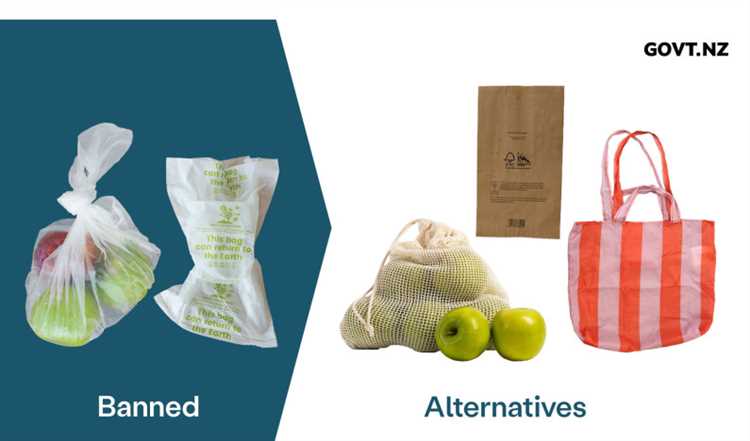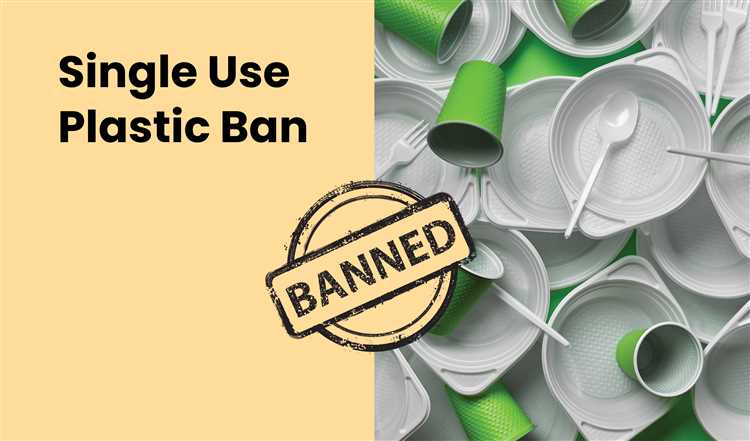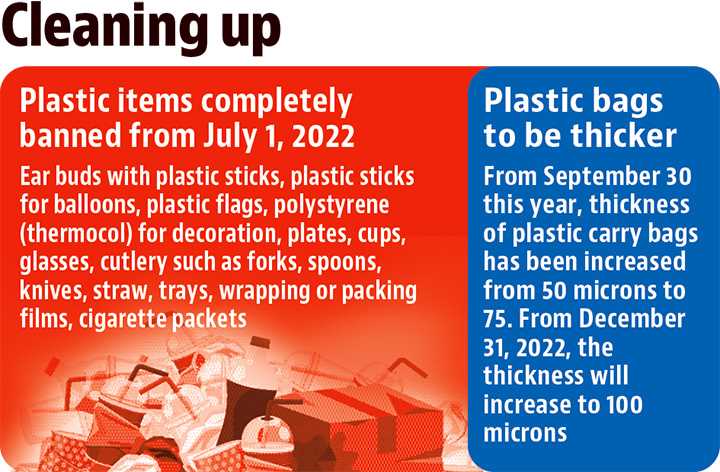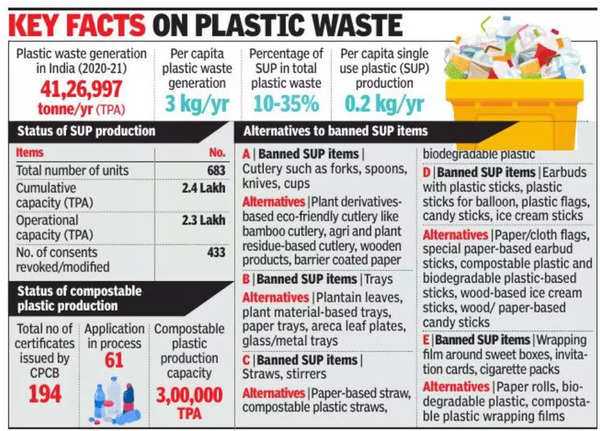
Starting from 1 July, a nationwide ban on single-use plastics will come into effect in order to tackle the growing environmental crisis caused by plastic waste. This ban aims to reduce the amount of plastic pollution in our oceans, landfills, and ecosystems, and to encourage a shift towards more sustainable and eco-friendly alternatives.
The new regulations will prohibit the production, sale, and distribution of items such as plastic bags, straws, cutlery, and styrofoam containers. Businesses and individuals alike will need to find alternatives to these single-use plastics in order to comply with the ban. This is a significant step towards preserving our planet and protecting the health of future generations.
Plastic pollution has become a global problem, with millions of tons of plastic waste ending up in our oceans each year. This has detrimental effects on marine life, leading to entanglement, ingestion, and suffocation of countless marine animals. Additionally, plastic waste takes hundreds of years to decompose, resulting in long-term environmental damage.
The ban on single-use plastics is just one part of a larger effort to address the plastic waste crisis. Governments, businesses, and individuals must all work together to reduce plastic consumption, promote recycling, and develop more sustainable solutions. By making small changes in our daily lives, such as using reusable bags and containers, we can all contribute to a cleaner and healthier planet.
- New Regulations and Restrictions
- Impact on Consumers and Businesses
- Impact on Consumers
- Impact on Businesses
- Sustainable Alternatives and Solutions
- 1. Reusable Bags
- 2. Stainless Steel or Glass Water Bottles
- 3. Biodegradable Alternatives
- 4. Composting
- 5. Bulk Shopping
- 6. Support Sustainable Businesses
- 7. Education and Awareness
- Environmental Benefits and Goals
- Enforcement Measures and Penalties
- Global Context and Examples
- 1. European Union (EU)
- 2. India
- 3. Kenya
- Question-answer:
- What is the plastic ban all about?
- Which plastic products are affected by the ban?
- What are the alternatives to plastic products?
- What should I do with my existing plastic products?
- What are the consequences for not following the plastic ban?
New Regulations and Restrictions
Starting from 1 July, new regulations and restrictions on plastic use will be implemented. These measures aim to reduce the environmental impact of plastic waste and encourage the use of more sustainable alternatives. Here are some key points to know:
- Ban on single-use plastics: Single-use plastic items such as straws, cutlery, plates, and stirrers will be prohibited. This ban is being put in place to discourage the use of items that are used once and then discarded, leading to excessive plastic waste.
- Plastic bags: Lightweight plastic bags, typically given out at grocery stores and supermarkets, will be banned. It is recommended to bring your own reusable bags when shopping to avoid any inconvenience.
- Sale of plastic bottles: The sale of plastic bottles below a certain size will be restricted. This is to promote the usage of refillable containers and reduce the consumption of single-use plastic bottles.
- Plastic packaging: Stricter guidelines will be in place for the use of plastic packaging by businesses. Efforts should be made to minimize plastic packaging and explore more sustainable alternatives.
- Plastic waste management: Proper waste management and disposal of plastic waste will be emphasized. Recycling and responsible disposal of plastic items will be encouraged to reduce the amount of plastic ending up in landfills and polluting our environment.
It is important for individuals, businesses, and communities to make the necessary adjustments to comply with these new regulations. By reducing plastic use and embracing more sustainable practices, we can protect our environment and work towards a greener future.
Impact on Consumers and Businesses
The plastic ban that will come into effect from 1 July will have significant impacts on both consumers and businesses. This ban aims to reduce the use of single-use plastics and promote more sustainable alternatives.
Impact on Consumers
Consumers will need to adjust to the new regulations and find alternatives to the single-use plastic items that will be banned. Some commonly used plastic items like straws, cutlery, and certain food containers will no longer be available.
This will require consumers to make changes in their shopping habits and explore reusable options. They will need to invest in reusable shopping bags, drink bottles, and containers for takeaway food. These lifestyle changes may require some initial investment, but they will help consumers in the long run by saving money and reducing their environmental footprint.
While the ban may initially cause inconvenience for some consumers, it presents an opportunity for individuals to be more conscious of their plastic consumption and become part of the solution to environmental problems.
Impact on Businesses
Businesses will be directly impacted by the plastic ban as they will need to find alternatives for packaging and other plastic materials they currently rely on. This may involve rethinking their supply chains and finding more sustainable options.
While there may be additional costs associated with finding and implementing these alternatives, businesses can also see it as an opportunity to showcase their commitment to environmental sustainability. By adopting more eco-friendly practices, businesses can attract environmentally conscious consumers and gain a competitive edge in the market.
Furthermore, the plastic ban can also drive innovation in the industry, leading to the development of new and more sustainable packaging materials. This can open up new business opportunities and create a market for innovative and eco-friendly products.
It is crucial for businesses to stay informed about the specific regulations and requirements related to the plastic ban to ensure compliance. By being proactive and taking the necessary steps to adapt to the ban, businesses can minimize disruptions and contribute to a more sustainable future.
Sustainable Alternatives and Solutions
With the plastic ban taking effect on 1 July, it is essential to explore sustainable alternatives and solutions to reduce our reliance on single-use plastics. Here are some options to consider:
1. Reusable Bags
One of the easiest and most effective ways to reduce plastic waste is to switch to reusable bags for shopping. Invest in durable, eco-friendly bags made from materials such as cotton or jute, and always carry them with you when you go shopping.
2. Stainless Steel or Glass Water Bottles

Plastic water bottles are a major contributor to pollution. Invest in stainless steel or glass water bottles that are designed for multiple uses. This not only reduces plastic waste but also helps you stay hydrated in a sustainable way.
3. Biodegradable Alternatives
Look for biodegradable alternatives to common plastic items such as cutlery, plates, and straws. These are often made from materials like bamboo, paper, or cornstarch, which break down much faster in the environment.
4. Composting
Another great way to reduce waste is through composting. Instead of throwing away food waste, start a composting system in your backyard or community. This not only diverts waste from landfills but also produces nutrient-rich compost for your plants.
5. Bulk Shopping
Buying in bulk reduces packaging waste. Instead of purchasing individual items with excessive packaging, opt for buying in larger quantities. Bring your own reusable containers to store the items and reduce the need for single-use plastic packaging.
6. Support Sustainable Businesses
Choose to support businesses that prioritize sustainability and offer plastic-free alternatives. Many coffee shops, grocery stores, and restaurants now provide compostable or reusable options for takeout containers and cups. By supporting these businesses, you are encouraging more sustainable practices in the community.
7. Education and Awareness
Educate yourself and others about the negative impacts of plastic on the environment and the benefits of sustainable alternatives. By spreading awareness and encouraging others to adopt eco-friendly practices, we can collectively make a significant difference in reducing plastic pollution.
By implementing these sustainable alternatives and solutions, we can all contribute to a cleaner and greener future. Let’s embrace the plastic ban as an opportunity to make positive changes for our planet.
| Advantages of Sustainable Alternatives | Disadvantages of Plastic |
|---|---|
| Reduced plastic waste | Environmental pollution |
| Conservation of natural resources | Health risks from chemical leaching |
| Positive impact on wildlife | Microplastic contamination |
| Helps combat climate change | Long decomposition period |
Environmental Benefits and Goals

The plastic ban, implemented from 1 July, seeks to address the urgent need to reduce plastic waste and its impact on the environment. By reducing the production and consumption of single-use plastic items, the ban aims to achieve several key environmental benefits:
- Reduced Plastic Pollution: The ban will help prevent plastic waste from ending up in our oceans, rivers, and landfills, reducing the harm it causes to marine life and ecosystems. This will contribute to the preservation of our natural environment.
- Conservation of Resources: By reducing the demand for plastic, the ban encourages the conservation of resources used in plastic production, such as fossil fuels and water. This is important since the extraction and processing of these resources have significant environmental impacts.
- Improved Air and Water Quality: The production and incineration of plastic releases harmful pollutants into the air and water, contributing to air pollution and water contamination. The ban aims to reduce these emissions, leading to improved air and water quality for humans and ecosystems.
- Protection of Wildlife: Plastic waste poses a significant threat to wildlife, as animals can become entangled in it or mistake it for food. By reducing plastic waste, the ban helps protect wildlife and their habitats, contributing to biodiversity conservation.
- Promotion of Sustainable Alternatives: The ban encourages the adoption and use of sustainable alternatives to single-use plastics, such as reusable bags, bottles, and packaging materials. This promotes a shift towards more sustainable consumption patterns and the development of a circular economy.
Overall, the plastic ban aims to bring about positive environmental changes by reducing plastic pollution, conserving resources, improving air and water quality, protecting wildlife, and promoting sustainable alternatives. It is an important step towards creating a more sustainable and resilient future for our planet.
Enforcement Measures and Penalties
With the plastic ban coming into effect on 1 July, strict enforcement measures and penalties will be put in place to ensure compliance with the new regulations. The government is committed to crack down on the use of single-use plastics and aims to create a more sustainable environment for future generations.
Businesses found in violation of the plastic ban may face heavy fines and penalties. The exact amount of fines will vary depending on the severity of the violation and the number of previous offenses. It is important for businesses to understand and follow the new regulations to avoid any penalties.
Inspectors will be conducting regular checks and inspections to ensure businesses are adhering to the plastic ban. They will be checking for the use of banned plastic items such as single-use plastic bags, plastic straws, and plastic utensils. If a business is found to be using these items, they may be issued a warning, fined, or even have their operations temporarily shut down.
In addition to fines, businesses may also face other consequences for non-compliance with the plastic ban. These consequences may include loss of licenses or permits, loss of business reputation, and potential legal action from environmental agencies or advocacy groups.
Individuals are also responsible for complying with the plastic ban. They are encouraged to use alternatives to single-use plastics such as reusable bags, metal or bamboo straws, and biodegradable utensils. Education campaigns and public awareness initiatives will be launched to inform individuals about the harmful effects of plastic pollution and the importance of reducing plastic waste.
It is important for everyone to understand and support the plastic ban to make a positive impact on the environment. By working together, we can reduce plastic waste and create a cleaner and more sustainable future.
Global Context and Examples
The issue of plastic waste and pollution is a worldwide concern, with countries around the globe taking measures to address the problem. Here are a few examples of plastic bans and initiatives from different parts of the world:
1. European Union (EU)
The EU has been at the forefront of the global fight against plastic pollution. In 2018, the European Commission proposed a ban on single-use plastics such as straws, cotton buds, and cutlery. The ban, which came into effect in July 2021, aims to reduce marine litter and promote a more sustainable economy.
2. India
In 2019, India announced a nationwide ban on several single-use plastic items such as bags, cups, and plates. The ban aims to phase out these items and encourage the use of alternatives such as paper bags and eco-friendly packaging materials. Violators of the ban may face penalties and fines.
3. Kenya

Kenya implemented one of the world’s toughest plastic bag bans in 2017. The country introduced heavy fines and even imprisonment for the production, sale, or use of plastic bags. This initiative has led to a significant reduction in plastic waste and an increase in the use of alternative packaging materials.
These examples highlight the global recognition of the need to tackle plastic pollution. The measures taken by different countries serve as inspiration and proof that change is possible. By implementing similar bans and initiatives, governments worldwide can contribute to a cleaner and more sustainable future.
Question-answer:
What is the plastic ban all about?
The plastic ban is a new regulation that is being implemented from 1 July. It aims to reduce the use of single-use plastic products in order to protect the environment and reduce waste.
Which plastic products are affected by the ban?
The ban applies to a wide range of single-use plastic products, including single-use plastic bags, straws, cutlery, plates, cups, and beverage stirrers. These items will no longer be available for sale or distribution in most shops and restaurants.
What are the alternatives to plastic products?
There are many alternatives to plastic products that can be used instead. For example, reusable bags made from fabric or other durable materials can be used instead of plastic bags. Similarly, biodegradable or compostable materials can be used for cutlery and food containers.
What should I do with my existing plastic products?
If you have any single-use plastic products, it is recommended to dispose of them properly. You can check with your local waste management authority for guidance on how to do this. Additionally, it is a good idea to start transitioning to alternative, more sustainable options.
What are the consequences for not following the plastic ban?
There may be fines or penalties for businesses or individuals who do not comply with the plastic ban. The exact consequences will vary depending on the specific regulations in your location. It is important to familiarize yourself with the local requirements and take the necessary steps to comply.